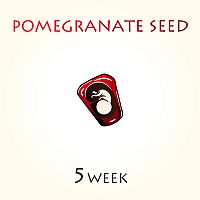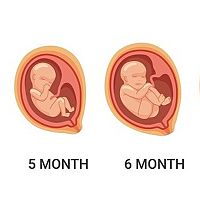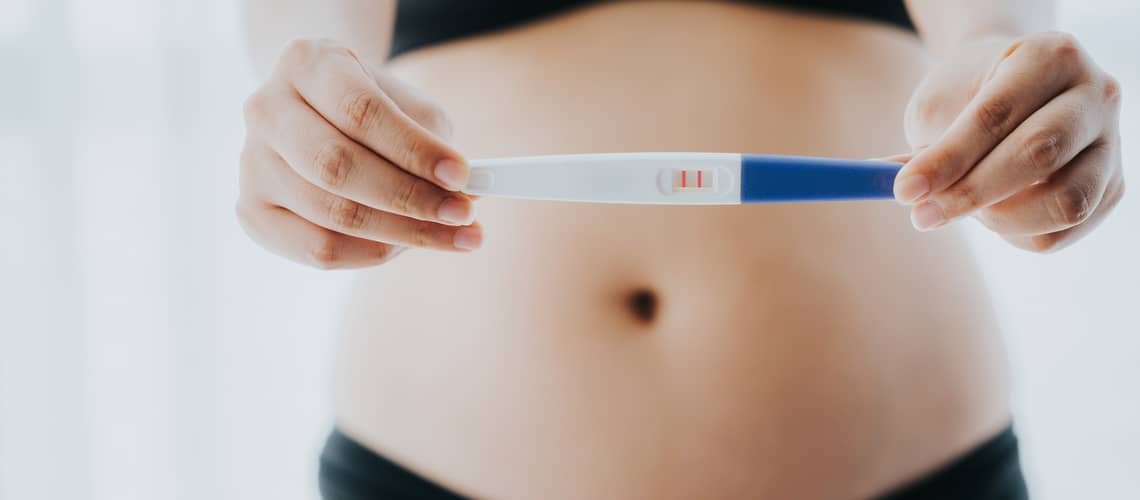
5th week of pregnancy – ultrasound, belly, pain in the lower abdomen and the size of the fetus
During the previous days, the blastocyst has settled definitively in the uterus, the fertilized egg is already called an embryo, which has begun its development, and the cells that ensure the growth of the placenta have also separated. In the 5th week, the baby develops again, cells slowly turn into organs and systems also develop. Most women already start to notice certain symptoms, including delayed menstruation. In most cases, other pregnancy symptoms will also appear. A pregnancy test will probably prove your intuition right. How does a baby develop and grow? What is the size of the fetus in the 5th week of pregnancy? Is it time for a pregnancy test at 5 weeks?
The fifth week is the beginning of the 2nd month of pregnancy (1st trimester) and 3 weeks have already passed since conception. In the 5th week, it is quite likely that you will notice certain changes in your body and organism. In addition to the fact that menstruation is late, the uterus is also getting slightly larger and it is quite possible that if you have not started to notice the first signs of pregnancy until now, you will start during this period. The level of the hCG hormone also increases many times, therefore it is assumed that the pregnancy test will clearly reveal pregnancy.
5th week of pregnancy - baby's development
Embryo development continues. Cells in three layers take care of the development of all systems, organs, bones and muscles. At the end of the 5th week, the embryo can be around 1.5 to 3 mm in size. In practice, it is often compared to a sesame seed or an apple core. The embryo is still in the amniotic sac and receives nutrients through the vessel in the yolk sac. Nevertheless, in terms of development, big changes are happening. Small growths begin to protrude from the small embryo, which will become limbs in later weeks.
The circulatory system is the first to develop and begin to function. Approximately in the middle of the embryo, a cavity is formed in which it develops, so far only a simple microheart, which subsequently ensures circulation and pumps blood in the embryo, thereby nourishing and supplying it with blood. At the end of the 5th week, the heart can take on its original shape, but it still beats irregularly. In some cases, it is already possible to observe the growing gestational sac on ultrasound. The embryo also forms a bond with the mother with the help of the umbilical cord, which grows and blood vessels are formed that connect the mother with the child. Simultaneously with the development of the embryo, the placenta is formed, which has a head start. The placenta begins to fulfill its primary role only around the 12th trimester.
By the end of the 5th week, the basis of the nervous system is already developed, where the brain and spinal cord will form. The development of the nervous system is important, because if the canal-groove (neural tube) with the nerve endings does not close sufficiently early (by the 6th tt at the latest), there is a high risk of spina bifida. Folic acid can effectively help cell division, which is why women planning to become pregnant are advised to increase their intake even before conception itself. The digestive system begins to develop very slowly. It is a tube that is still directed towards the tail of the embryo. Later it will go to the stomach.
Embryo on ultrasound in the 5th week of pregnancy
Although some mothers are able to "squeeze out" a visit to the gynecologist for the purpose of an ultrasonographic examination even at such an early stage of pregnancy, they are often left disappointed. It is not always possible to confirm pregnancy in the 5th week by ultrasonography, because the gestational sac or embryo may not be visible at all in this week. Of course, there are exceptions. Also, an early visit can have various health-medical reasons. However, in most cases, the doctor still cannot confirm the pregnancy clinically, so it is recommended to wait. A blood sample can only confirm the increased value of pregnancy hormones. In the 5th trimester, the hCG hormone ranges from 18 to 7,340 mlU/ml.
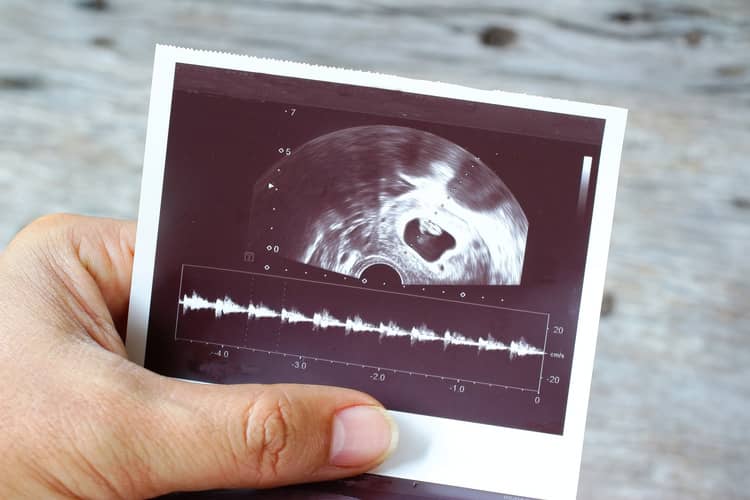
Time for a pregnancy test
Many women do not even last until the 5th trimester, as soon as they notice certain desired symptoms of early pregnancy, they take a pregnancy test, which can show them a positive result even during the 4th trimester. However, in the 5th week, the value of the hCG hormone in the urine is more concerted, so there is a higher probability that the test will really confirm the pregnancy. However, it is still only a biochemical pregnancy, which has not yet been clinically confirmed.
It means that pregnancy is proven only on the basis of the chemical indicator hCG. It is recommended to repeat the pregnancy test at least 48 to 72 hours apart. If it is positive again, it is advisable to make an appointment with the gynecologist for the first initial examination. The pregnancy will be definitively clinically confirmed only at the moment when the gynecologist observes an embryo (fetus), gestational sac or registers obvious activity of the heart on the basis of an ultrasonographic examination. It is most often possible only from the 6th week.
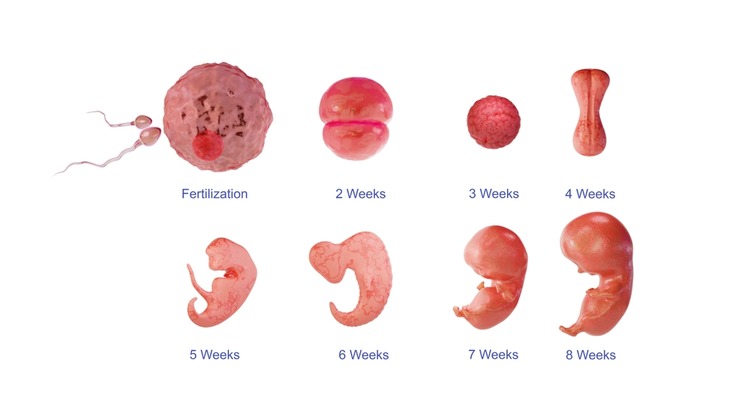
5th week of pregnancy - symptoms
Perhaps the most significant symptom of pregnancy for many women is the missed period. Three weeks have passed since conception, and if menstruation has not occurred, it is advisable to take a pregnancy test. In the 5th week of pregnancy, the uterus is already growing, which also affects other symptoms that may appear. However, there are still cases where women did not experience any symptoms that would clearly indicate pregnancy in the 5th week of pregnancy.
Hormones, which increase their effects at this time, are responsible for all changes. In addition to hCG (human chorionic gonadotropin), important hormones are progesterone (supports placental functions, breast growth and coordinates uterine contractions), estrogen (increases blood flow through the placenta and affects breast size), relaxin (relaxes ligaments for fetal and uterine growth) or oxytocin (important during the birth itself). Each of these hormones has its own obvious role, but the body's common goal is to maintain pregnancy. The typical unmistakable symptoms of pregnancy, which can appear in some women in the 5th week or earlier or later, include, for example, the following:
- missed period
- sensitive sense of smell
- increased fatigue,
- aversion to certain foods,
- sensitivity/irritability,
- metallic taste in the mouth,
- inflating
- slower digestion,
- nipple darkening
- urge to urinate
- stuffy nose (pregnancy runny nose),
- morning sickness or dizziness.
In the 5th week of pregnancy, women may also experience pain in the lower abdomen or mild back pain. This can be caused by bloating or stretching itself - the enlargement of the uterus. This period is extremely sensitive for maintaining pregnancy. In many cases, women have spotting in the 5th week of pregnancy, or light bleeding. Due to the blood flow of the uterus and cervix, this can be a completely normal phenomenon. Nevertheless, you will do well to go for a check-up with your doctor to confirm the maintenance of the pregnancy. Pay attention if vaginal bleeding with blood clots or traces of fresh blood appears, even in conjunction with lower abdominal cramps and back pain. It can be symptoms of ectopic pregnancy or miscarriage.
5th week of pregnancy - experiences
In discussions, women primarily deal with various symptoms that may appear in the 5th week of pregnancy. Some women vomit from the 4th trimester, others don't know they are pregnant until the 5th trimester. Every pregnancy is different and the women discussing it agree that the symptoms are diametrically different for every woman. The various reported symptoms typical for a given week of pregnancy in many women do not appear until a few weeks later or do not appear at all. Symptoms reported by women include pain in the lower abdomen or lower back pain, which may not be a miscarriage or an ectopic pregnancy. Even light bleeding or spotting during the 5th week of pregnancy does not have to be a problem. For one woman, spotting during this term may be normal, but for another, it may be a sign of complications.
The most frequent questions - FAQ
Did you visit your gynecologist in the 5th week of pregnancy, or gynecologist? Have you had an ultrasound examination? Has your doctor confirmed a clinical pregnancy? What symptoms did you experience in the 5th week of pregnancy? Have you noticed visible changes in your body? We are interested in your opinions, experiences and knowledge. At the same time, by contributing to the discussion under the article, you can help and advise other pregnant women or future mothers who are currently interested in this period. We look forward to your contributions. If you want your experience to be part of the text, write to us.
Is it appropriate to go for an ultrasound/sono in the 5th week of pregnancy?
What is the value of the hCG hormone in the 5th week of pregnancy?
What does the belly look like in the 5th week of pregnancy?
5th week of pregnancy, which month is it?
Gallery
Pridať komentár


